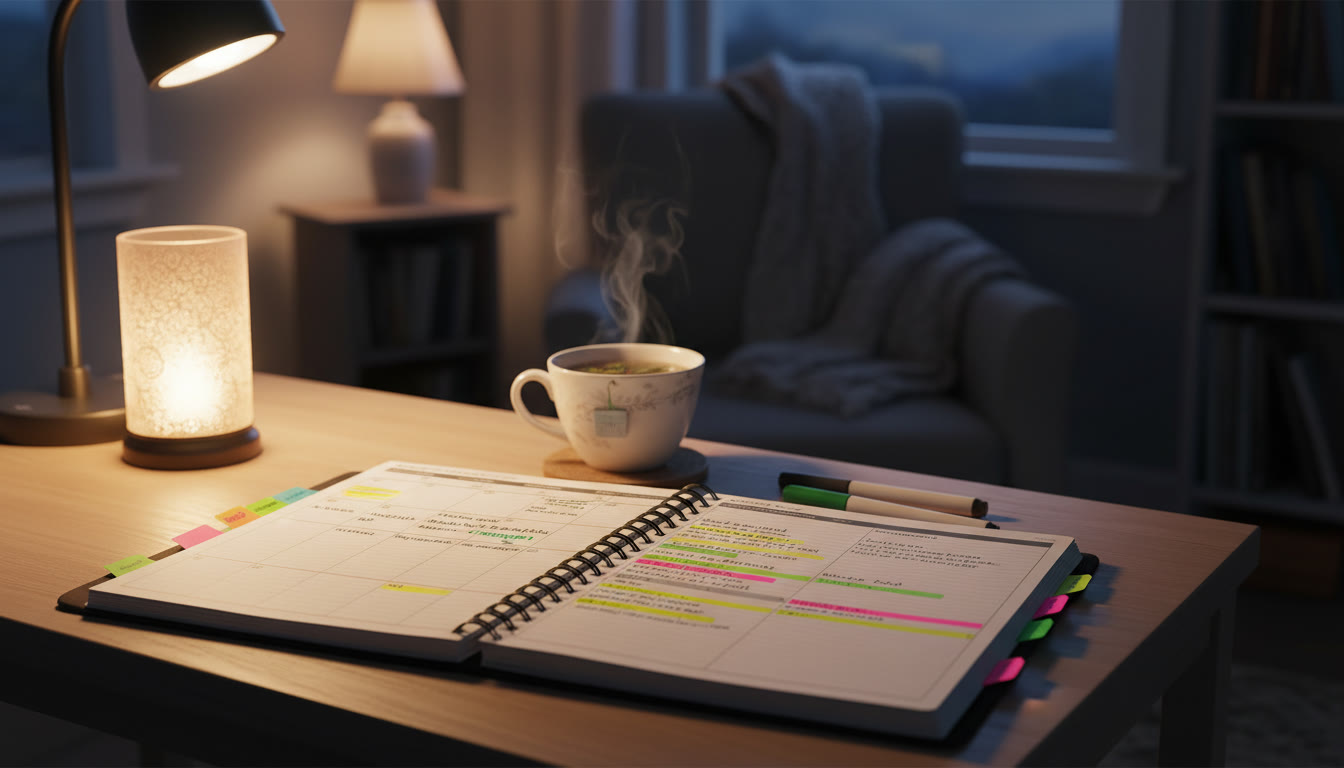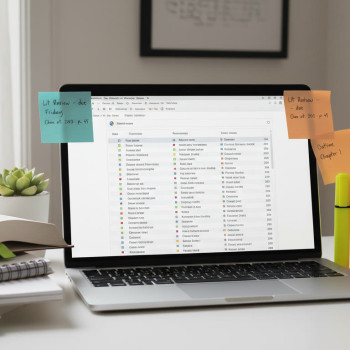Why the Night Before Matters (But Isn’t Doomsday)
The evening before an AP Language exam can feel like a tiny hurricane: adrenaline, last-minute panic, and the temptation to cram everything at once. Yet the night before is rarely the place where scores are made or broken. Instead, it’s the final tune-up — a chance to settle your brain, polish a few skills, and set up physical and mental conditions that let your knowledge show up clearly the next day.
This post gives you a calm, practical, and targeted review plan for that crucial night. It’s designed for AP Language (and similar advanced placement language exams) but the principles fit any high-stakes language test. The aim: light, high-leverage review—no last-minute encyclopedias of facts, no stressful marathon sessions, just focused moves that yield big returns.

Set the Tone: Rituals to Reduce Panic and Boost Focus
How you spend your evening sets your nervous system for the next day. A few gentle rituals can keep stress low and attention high:
- Turn off intensive study two hours before bed—switch to light review or relaxation.
- Prepare logistics: pack your bag (photo ID, pencils, calculator if allowed, snacks), set multiple alarms, and check your testing location and travel time.
- Use a 5–10 minute breathing or grounding practice to settle your mind before bed.
- Eat a balanced dinner and hydrate—avoid heavy or sugary meals that disrupt sleep.
These steps sound small, but they remove friction and worry on test morning so your brain can do its main job: think clearly.
90–60 Minutes: Targeted Review — What to Touch (and What to Skip)
When you only have an hour or two, prioritize high-leverage, low-effort activities that sharpen skills rather than bury you in new information. Here’s a checklist of effective moves.
Active Reading Warm-Up (15–25 minutes)
Do one short, focused active-reading exercise. Pick a passage roughly 500–800 words—an op-ed, a rhetorical analysis, or a complex short excerpt—and practice the following:
- Read for purpose: identify speaker, audience, occasion, and tone.
- Annotate for rhetorical strategies (diction, imagery, parallelism, ethos/logos/pathos) using quick marginal notes.
- Summarize the author’s thesis in one sentence and list two evidence lines you’d cite in an essay.
This primes your rhetorical lens and warms up the analytical muscles that matter most on AP Language sections.
Grammar and Style Rapid Check (10–15 minutes)
Work through a short set (6–10) of focused grammar questions—comma usage, pronoun agreement, parallel structure, modifier placement. The goal is to refresh recognition patterns, not to learn rules from scratch.
- If you get a question wrong, jot a one-sentence rule and one example for future review.
- If you’ve been working with a tutor or a study platform, use one short personalized worksheet to target your typical error types.
Timed Synthesis Drill (15–20 minutes)
Do one short timed writing practice: 20 minutes to plan and write a focused analysis of a short passage or to craft a clear thesis and two supporting paragraphs responding to an argument. The goal is clarity and organization—intro with thesis, two evidence paragraphs, and a one-sentence conclusion.
- Time yourself. After writing, spend 5 minutes quickly editing for clarity and grammar.
- Use a simple checklist: Clear thesis? Textual evidence? Smooth transitions? Varied sentence structure?
What to Avoid: Cramming, New Topics, and Overcorrection
Resist three common night-before traps:
- Learning entirely new content. Novel frameworks or large skill sets take time; the night before is for sharpening, not starting.
- Marathon practice tests. A full exam will tire you and interfere with sleep. Save full-lengths for earlier in your schedule.
- Overcorrecting every mistake. Pick the highest-frequency error types you make and address those. Don’t chase perfection.
Sleep and Physiology: High-Value Nonacademic Moves
People underestimate how much sleep, food, and temperature affect exam performance. Treat them as part of your study plan:
- Aim for 7–9 hours of sleep. Even a single well-timed full sleep cycle improves memory consolidation and focus.
- Set out test-day clothes and snacks. Choose familiar, low-sugar foods and a hydrating drink.
- Keep morning caffeine moderate—a small coffee or tea if that’s your usual routine. Don’t introduce new stimulants.
- Get light exposure early on test morning (open curtains or a brisk walk) to reset your circadian rhythm and sharpen attention.
Micro-Memory Tools: Quick Reference Charts and Mnemonics
Create—or consult—a single page of distilled memory aids for last-minute review. This is the “cheat sheet” you mentally carry, not to use in the test. Keep it short and focused:
- Two-line grammar reminders (e.g., subject-verb agreement tips, comma rules).
- Three rhetorical devices you most often use or need to recognize, with examples.
- A five-step paragraph plan: Topic Sentence, Context, Quote, Analysis, Transition.
Sample One-Page Cheat Sheet (Table)
| Category | Quick Reminder | Example |
|---|---|---|
| Thesis | One clear claim that answers the prompt directly. | “Author X argues that Y because of A and B.” |
| Evidence | Quote + brief context + relevance sentence. | “…(line 12–14)” → shows contrast between … |
| Grammar | Check pronoun references, comma splices, parallel lists. | “She wanted coffee, sleep, and a quiet room.” |
| Rhetorical Moves | Look for repetition, rhetorical questions, and tone shifts. | Repetition emphasizes a theme; questions engage readers. |
| Paragraph Plan | TS → Context → Evidence → Analysis → Transition. | “While X claims…, the passage suggests…” |
Test-Day Morning Routine: Small Wins That Build Momentum
How you start the morning matters. Keep it consistent and low-stress:
- Wake up with time to spare—no rushing.
- Do a 5–10 minute warm-up: a single reading paragraph and two short grammar questions to get synapses firing.
- Review your one-page cheat sheet—quick scan, not a deep dive.
- Arrive early to the testing center. Use waiting time to breathe and visualize doing well, not to cram unfamiliar material.
On the Exam: Time Management and Tactical Moves
The test is as much about strategy as content. Here are tactical moves that help you maximize score:
- Skim the entire section quickly to prioritize passages you find more accessible.
- If a passage or prompt is slow to yield ideas, move on and return later—don’t let it consume time.
- For essays: spend 4–6 minutes planning, 30–35 minutes writing (if a 40–minute task), and 3–5 minutes revising. A brief plan saves time when writing.
- Annotate efficiently—use symbols and short margin notes. Capture evidence line numbers for easy citation.
How to Use Feedback from Past Practice Without Getting Overwhelmed
If you’ve received feedback from teachers, peers, or tutors like Sparkl’s personalized tutoring, focus on the patterns not isolated comments. Here’s a fast process:
- Identify up to three recurring issues (e.g., weak thesis clarity, weak textual integration, grammar consistency).
- On the night before, practice short drills that map to those areas: a thesis-rewrite exercise, an evidence-integration paragraph, and three grammar questions.
- Ask your tutor for a 15–20 minute targeted session earlier in the week to align on these priorities—this is where one-on-one guidance pays off most.
Mindset: Reframing Pressure Into Purpose
Pressure can help if channeled. Shift your inner narrative from “This will ruin everything” to “This is a chance to show what I’ve practiced.” A few mindset anchors:
- Focus on process, not perfection—do the clear thing you practiced, not the perfect thing you imagined.
- When anxiety rises, breathe and return to the next step: plan, annotate, write, revise.
- Trust your preparation. You prepared with many small, cumulative efforts; tonight is a polish, not a rescue mission.
Practical Examples: Night-Before Templates
Here are two concrete templates you can adapt depending on how much time you have.
60–90 Minute Template (Tight Evening)
- 15 min — Active reading: annotate one passage + 1-sentence thesis summary.
- 15 min — Grammar/style rapid check (6–8 targeted questions).
- 25–30 min — Timed 20-minute writing + 5–10 minute revision.
- 10–15 min — Pack bag, set clothes, prepare snacks, and breathe.
2–3 Hour Template (More Comfortable)
- 20–25 min — Active reading + write a quick paragraph analysis.
- 15 min — One focused grammar worksheet.
- 30 min — Timed essay practice (include planning and revision).
- 20–30 min — Review one-page cheat sheet and log any recurring error types.
- 15–20 min — Light movement (walk/stretch), then wind down for bed.

Why Short, Smart Work Beats Last-Minute Marathon Cramming
Research on learning shows that spaced practice, retrieval, and sleep beat massed learning (cramming). The night before is best used for retrieval (active recall) and organization. Short, intentional practice reinforces the neural pathways you’ve built during weeks of studying; long, desperate cramming often leaves you exhausted and blurrier rather than clearer.
Use Technology Wisely: Tools That Help (Without Distraction)
Choose low-distraction tools that support focused practice:
- Timed writing prompts and a simple word-count or timer app.
- Annotation tools or a plain notebook for quick margin marks.
- Brief, targeted sessions with a tutor (for example, Sparkl’s personalized tutoring) to get one-on-one guidance and a clear plan for revision earlier in the prep cycle.
Remember: the night before is not the time to download new apps or watch unfamiliar lesson series. Use resources you already know and that don’t derail sleep or focus.
Common Night-Before Questions — and Short Answers
- Should I review vocabulary lists? Only if you have a short, active list of words you actually use in analysis. Otherwise skip rote vocab cramming.
- Is practice test recommended? Not in full. A one-passage timed drill is fine; save full-lengths for earlier.
- How much caffeine is okay? What’s typical for you. Don’t double your usual intake.
- Should I rewrite a practice essay I did poorly on? Not fully—identify the core mistakes, write a short paragraph fixing them, and move on.
How Tutors Can Make the Night-Before Strategy Work for You
A short coaching cycle with a tutor can multiply the impact of your night-before routine. Here’s how to make it efficient:
- Schedule a 30–45 minute session earlier in the week to identify patterns and create a one-page cheat sheet tailored to you.
- Ask for a 10–15 minute check-in two days before the exam for quick confidence calibration and targeted advice.
- Use one-on-one guidance to compress feedback loops—tutors can spot recurring structure or evidence-integration issues in minutes and give practical fixes.
If you use a service like Sparkl’s personalized tutoring, focus sessions on clarifying thesis construction, evidence integration, and any specific grammar patterns you routinely miss. This targeted feedback is high ROI and fits naturally into a light night-before plan.
Final Checklist: Night Before and Morning Of
| Night Before | Morning Of |
|---|---|
| Complete focused 60–90 minute review. | Wake with time to spare; light warm-up reading. |
| Pack bag: pencils, ID, snacks, watch, allowed calculator. | Eat a balanced breakfast; moderate caffeine if typical. |
| Lay out clothes and travel plan. | Arrive early; use breathing or visualization techniques. |
| Quick scan of one-page cheat sheet before bed. | Scan cheat sheet for 3 minutes; do 5–10 minute focused drill. |
| Sleep 7–9 hours if possible. | Stay calm; implement test-time pacing strategy. |
Parting Thought: Trust the Work You’ve Done
The night before is a caretaking moment. Think of it as laying out the stage for your knowledge to perform—lighting, props, and a few practiced lines—not writing a new script. Short, targeted practice, smart logistics, and a calm mindset will get you farther than desperation ever could.
If you want a tailored one-page cheat sheet or a 20–30 minute targeted tutor check-in that fits this exact night-before plan, a brief session with a tutor can be a perfect last-week investment. Personalized tutoring—one-on-one guidance, tailored study plans, expert tutors, and AI-driven insights—helps you focus on the habits and errors that truly move the needle, so your night-before work is precise and confidence-building.
Good luck—you’ve prepared for this. Breathe, trust the process, and bring your clearest thinking to the page.


















No Comments
Leave a comment Cancel